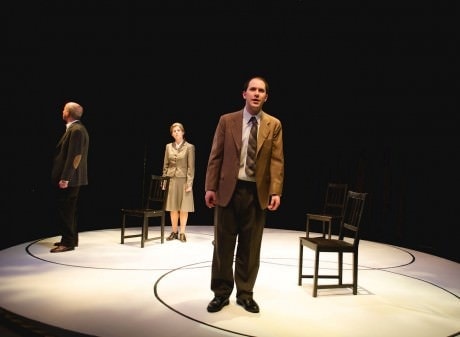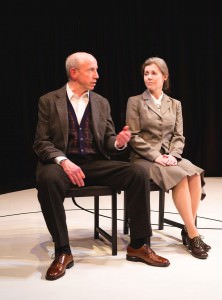Forget, for the moment, all you know about quantum physics.
It’s history that matters in Copenhagen, Michael Frayn’s Tony Award-winning, World War II drama. Make that revisionist history, which, after all, is a writer’s stock and trade.

This heady, two-act play explores a furtive 1941 tête-à-tête between two nuclear physicists drafted in the atomic bomb race – one the half-Jewish pioneer Niels Bohr and the other his protégé, Third Reich commodity Werner Heisenberg. (Heisenberg was the one hailed for his Uncertainty Principle, which, in layman’s terms, addresses the limits of knowledge about particulate matter).
But particulars don’t matter here.
The play’s backtracking spins more on motive than material witnesses. In a non-specific netherworld, the spirits of Heisenberg, Bohr and Bohr’s wife, Margrethe, ricochet across time and theater space, repelling and dispelling theories spanning all disciplines, from science, religion, philosophy, politics, mathematics, logic. Yet no one knows precisely what happened at the meeting, as Bohr’s Complementarity Principle might predict (you know the one: opposing behaviors of particles cannot be observed simultaneously, but together offer a fuller picture than when taken alone).
With its formidable three-person cast and mass of brainpower and achievement among its production team, Rockville Little Theatre is the “Little Theatre That Could” tackle such weighty matters. Lighting Designer Jason Wells went to Yale; Stage Designer Jacob Kresloff doubles as a dramaturg; Costume Coordinator Jacy Barber is a professional artist with a Master’s in environmental science. And that only scratches the surface of this company’s impressive credentials.
Director Heather Benjamin fuses marvelous body language and raw chemistry between John Decker (Bohr) — a real-life NASA rocket scientist — and earnest Ben Swiatek (Heisenberg), plus third-wheel Mary Ann McAllister (Margrethe), who is mostly along for the ride, to create Rashomon-like synergy. Our heads are engaged. What’s largely missing, though, is the heart.
The team certainly did its homework. Proof hits you in the lobby with dramaturg Bob Ashby’s veritable museum exhibit of photo archives and research. Past and present technology converge with a Google doodle from Oct. 7, 2012, celebrating Bohr’s 127th birthday. The play itself seems pegged to the 100th anniversary of Bohr’s atomic model (who knew?). Piped into the theater, as part of the crisp and thoughtful sound designed by Benjamin and coordinated by Kevin O’Connell, are Beethoven’s ‘Sonata for G minor for cello,’ soothing German Lieder, a smattering of Wagner? A ticking clock serves as overture. Train murmurings underscore RLT’s ambitious journey as the Little Theater That Could.
On Benjamin’s stage decorated with three concentric circles, the players parry, rearranging often empty chairs while volleying and dodging accusations. They shift from being static and isolated as nuclei in their personal cells (at times quite lifeless … because they’re dead?) to darting about like neutrons, photons and electrons — spotlighting the triangulation of what actors know too well as experience: action, reaction, potential chaos (for instance, when a line is dropped).
The effect is a bellicose ballet, so lovely to look at.
Barber’s costuming is smart and tailored to the tale — Decker’s professorial, posh sweater vest; Swiatek’s earthy scientist ensemble; McAllister’s antique brooch and Frau shoes. The only glitch: Decker’s spanking-new Oxfords squeaked distractingly as he paced.
Wells’ lighting of the cavernous, half-moon stage is, in a word, brilliant. He beams us from the blinding, interrogation glow of the characters’ afterlife to the warm, autumn evening of the night in question, again and again. Against so much coded dialogue, though, it’s a pity not to have maximized the lighting effects to help plot more of the play’s emotional turf. Poetic light filters are underused and the static glare of a soccer-ball-white stage in the first act saw several patrons fighting to keep their eyes open.
Aside from an overly breathless delivery, Swiatek excels at broadcasting the true soul of a scientist. He stands purposefully, ever on the precipice of discovery, using every atom in his body to convey good conscience. He earns high praise for a climactic account of Heisenberg’s encounter with an SS officer.
Decker clings to the complex material with reverence, but as an explosive, defensive father figure comes across a bit bottled up.
McAllister, tasked in the role as audience advocate — both an observer and a distiller of the scientists’ refracted truths — sits beautifully in repose but, given her background as a voice artist, disappoints. She speaks in exacting tones and is a lovely presence, failing to plumb the pathos of this tantalizing script.
Burdened with so much to memorize, however, this cast surpasses the aptitude test. It’s only the pacing of the dialogue, amid all that pacing, that somehow misses its mark. It also might have been nice to have tempered the tech talk with more emphasis on the language arts. Maybe some German or Danish accents. Maybe pronouncing “fission” with more zzzzz so as not to sound so much like “fishin’.” Or injecting one law of physics fallen by the wayside: more gravity, as in the severity of consequence, that low, tremulous pitch of fate.
After all the he-said-he-said quibbling is said and done, what crystallizes is that whatever happened in the microcosm of one long-ago, faraway mutual misunderstanding changed the course of global history. Mind blown.
To quote the revered Albert Einstein: “The most beautiful experience we can have is the mysterious. It is the fundamental emotion that cradles true art and true science. Whoever can no longer wonder, no longer marvel, is as good as dead, and his eyes are dimmed.”

As a testament to its theatrical experiment, RLT delivers a beautiful, mysterious experience proving the relativity and relevancy of history’s most obscure “facts.”
And even though this production merely skims the emotional well, at the end of the roller coaster ride we arrive at the heart of the matter: that, in any age, as science pushes the limits of possibility, a black hole of ethics looms, predictably and as an afterthought.
We exit with eyes open. From the development of the A-bomb, to North Korea’s modern taunts and tinkerings to the quiet proliferation of drones that nonchalantly spy and kill, we wonder: What is a scientist’s role and how is knowledge exploited by the political agenda of his time?
Running Time: Approximately two hours, with a 15-minute intermission.
Copenhagen plays through March 24, 2013, at Randolph Road Theatre – 4010 Randolph Road, in Silver Spring, MD. For tickets, call the box office at (301) 221-5434.




